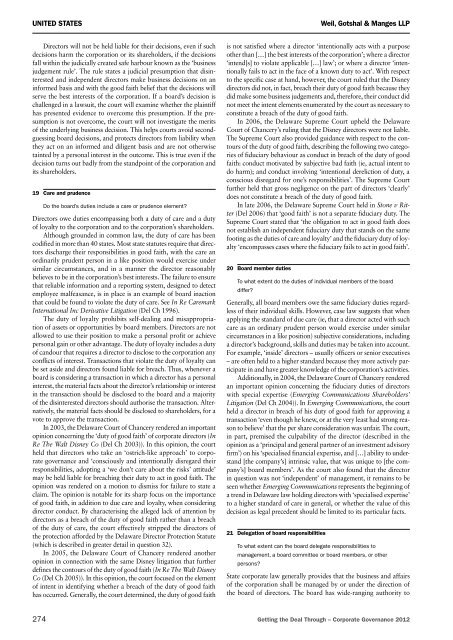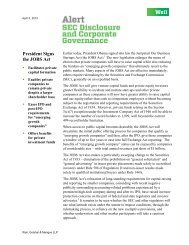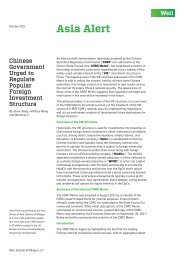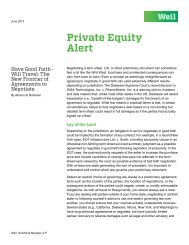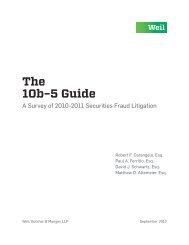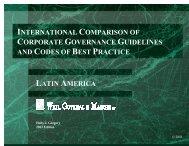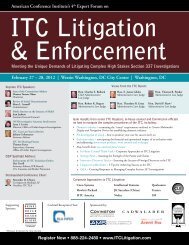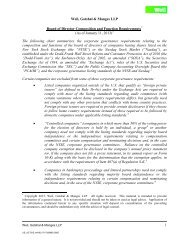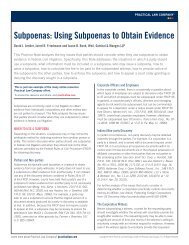Corporate Governance - Weil, Gotshal & Manges
Corporate Governance - Weil, Gotshal & Manges
Corporate Governance - Weil, Gotshal & Manges
Create successful ePaper yourself
Turn your PDF publications into a flip-book with our unique Google optimized e-Paper software.
United States<br />
<strong>Weil</strong>, <strong>Gotshal</strong> & <strong>Manges</strong> LLP<br />
Directors will not be held liable for their decisions, even if such<br />
decisions harm the corporation or its shareholders, if the decisions<br />
fall within the judicially created safe harbour known as the ‘business<br />
judgement rule’. The rule states a judicial presumption that disinterested<br />
and independent directors make business decisions on an<br />
informed basis and with the good faith belief that the decisions will<br />
serve the best interests of the corporation. If a board’s decision is<br />
challenged in a lawsuit, the court will examine whether the plaintiff<br />
has presented evidence to overcome this presumption. If the presumption<br />
is not overcome, the court will not investigate the merits<br />
of the underlying business decision. This helps courts avoid secondguessing<br />
board decisions, and protects directors from liability when<br />
they act on an informed and diligent basis and are not otherwise<br />
tainted by a personal interest in the outcome. This is true even if the<br />
decision turns out badly from the standpoint of the corporation and<br />
its shareholders.<br />
19 Care and prudence<br />
Do the board’s duties include a care or prudence element<br />
Directors owe duties encompassing both a duty of care and a duty<br />
of loyalty to the corporation and to the corporation’s shareholders.<br />
Although grounded in common law, the duty of care has been<br />
codified in more than 40 states. Most state statutes require that directors<br />
discharge their responsibilities in good faith, with the care an<br />
ordinarily prudent person in a like position would exercise under<br />
similar circumstances, and in a manner the director reasonably<br />
believes to be in the corporation’s best interests. The failure to ensure<br />
that reliable information and a reporting system, designed to detect<br />
employee malfeasance, is in place is an example of board inaction<br />
that could be found to violate the duty of care. See In Re Caremark<br />
International Inc Derivative Litigation (Del Ch 1996).<br />
The duty of loyalty prohibits self-dealing and misappropriation<br />
of assets or opportunities by board members. Directors are not<br />
allowed to use their position to make a personal profit or achieve<br />
personal gain or other advantage. The duty of loyalty includes a duty<br />
of candour that requires a director to disclose to the corporation any<br />
conflicts of interest. Transactions that violate the duty of loyalty can<br />
be set aside and directors found liable for breach. Thus, whenever a<br />
board is considering a transaction in which a director has a personal<br />
interest, the material facts about the director’s relationship or interest<br />
in the transaction should be disclosed to the board and a majority<br />
of the disinterested directors should authorise the transaction. Alternatively,<br />
the material facts should be disclosed to shareholders, for a<br />
vote to approve the transaction.<br />
In 2003, the Delaware Court of Chancery rendered an important<br />
opinion concerning the ‘duty of good faith’ of corporate directors (In<br />
Re The Walt Disney Co (Del Ch 2003)). In this opinion, the court<br />
held that directors who take an ‘ostrich-like approach’ to corporate<br />
governance and ‘consciously and intentionally disregard their<br />
responsibilities, adopting a ‘we don’t care about the risks’ attitude’<br />
may be held liable for breaching their duty to act in good faith. The<br />
opinion was rendered on a motion to dismiss for failure to state a<br />
claim. The opinion is notable for its sharp focus on the importance<br />
of good faith, in addition to due care and loyalty, when considering<br />
director conduct. By characterising the alleged lack of attention by<br />
directors as a breach of the duty of good faith rather than a breach<br />
of the duty of care, the court effectively stripped the directors of<br />
the protection afforded by the Delaware Director Protection Statute<br />
(which is described in greater detail in question 32).<br />
In 2005, the Delaware Court of Chancery rendered another<br />
opinion in connection with the same Disney litigation that further<br />
defines the contours of the duty of good faith (In Re The Walt Disney<br />
Co (Del Ch 2005)). In this opinion, the court focused on the element<br />
of intent in identifying whether a breach of the duty of good faith<br />
has occurred. Generally, the court determined, the duty of good faith<br />
is not satisfied where a director ‘intentionally acts with a purpose<br />
other than […] the best interests of the corporation’; where a director<br />
‘intend[s] to violate applicable […] law’; or where a director ‘intentionally<br />
fails to act in the face of a known duty to act’. With respect<br />
to the specific case at hand, however, the court ruled that the Disney<br />
directors did not, in fact, breach their duty of good faith because they<br />
did make some business judgements and, therefore, their conduct did<br />
not meet the intent elements enumerated by the court as necessary to<br />
constitute a breach of the duty of good faith.<br />
In 2006, the Delaware Supreme Court upheld the Delaware<br />
Court of Chancery’s ruling that the Disney directors were not liable.<br />
The Supreme Court also provided guidance with respect to the contours<br />
of the duty of good faith, describing the following two categories<br />
of fiduciary behaviour as conduct in breach of the duty of good<br />
faith: conduct motivated by subjective bad faith (ie, actual intent to<br />
do harm); and conduct involving ‘intentional dereliction of duty, a<br />
conscious disregard for one’s responsibilities’. The Supreme Court<br />
further held that gross negligence on the part of directors ‘clearly’<br />
does not constitute a breach of the duty of good faith.<br />
In late 2006, the Delaware Supreme Court held in Stone v Ritter<br />
(Del 2006) that ‘good faith’ is not a separate fiduciary duty. The<br />
Supreme Court stated that ‘the obligation to act in good faith does<br />
not establish an independent fiduciary duty that stands on the same<br />
footing as the duties of care and loyalty’ and the fiduciary duty of loyalty<br />
‘encompasses cases where the fiduciary fails to act in good faith’.<br />
20 Board member duties<br />
To what extent do the duties of individual members of the board<br />
differ<br />
Generally, all board members owe the same fiduciary duties regardless<br />
of their individual skills. However, case law suggests that when<br />
applying the standard of due care (ie, that a director acted with such<br />
care as an ordinary prudent person would exercise under similar<br />
circumstances in a like position) subjective considerations, including<br />
a director’s background, skills and duties may be taken into account.<br />
For example, ‘inside’ directors – usually officers or senior executives<br />
– are often held to a higher standard because they more actively participate<br />
in and have greater knowledge of the corporation’s activities.<br />
Additionally, in 2004, the Delaware Court of Chancery rendered<br />
an important opinion concerning the fiduciary duties of directors<br />
with special expertise (Emerging Communications Shareholders’<br />
Litigation (Del Ch 2004)). In Emerging Communications, the court<br />
held a director in breach of his duty of good faith for approving a<br />
transaction ‘even though he knew, or at the very least had strong reason<br />
to believe’ that the per share consideration was unfair. The court,<br />
in part, premised the culpability of the director (described in the<br />
opinion as a ‘principal and general partner of an investment advisory<br />
firm’) on his ‘specialised financial expertise, and […] ability to understand<br />
[the company’s] intrinsic value, that was unique to [the company’s]<br />
board members’. As the court also found that the director<br />
in question was not ‘independent’ of management, it remains to be<br />
seen whether Emerging Communications represents the beginning of<br />
a trend in Delaware law holding directors with ‘specialised expertise’<br />
to a higher standard of care in general, or whether the value of this<br />
decision as legal precedent should be limited to its particular facts.<br />
21 Delegation of board responsibilities<br />
To what extent can the board delegate responsibilities to<br />
management, a board committee or board members, or other<br />
persons<br />
State corporate law generally provides that the business and affairs<br />
of the corporation shall be managed by or under the direction of<br />
the board of directors. The board has wide-ranging authority to<br />
274 Getting the Deal Through – <strong>Corporate</strong> <strong>Governance</strong> 2012


